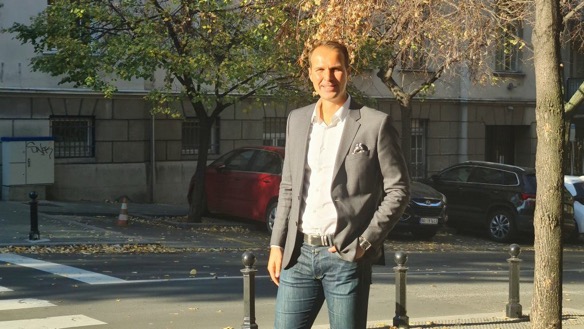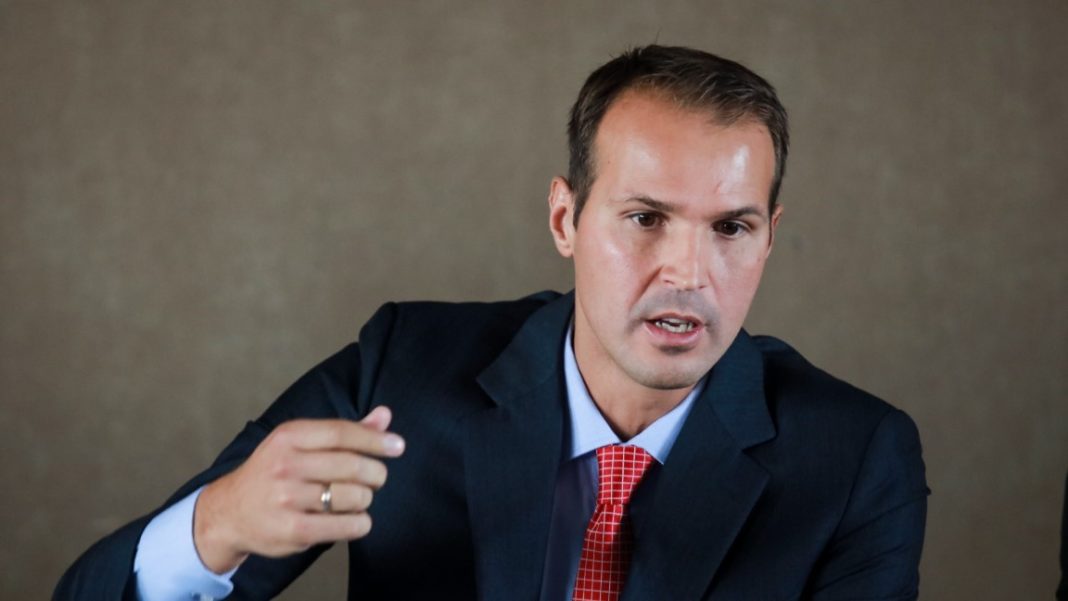Predrag Milovanovic, who brought the first-instance conviction in the famous case of a journalist whose house was set on fre, tells BIRN that rebuilding faith in Serbia’s courts is a slow process that takes time.
He is young and idealistic, wants changes in the Serbian judiciary, but fully respects the institution he represents – and is well aware that progress does not come overnight. He is also careful when picking words in sensitive political cases in a highly polarized society like Serbia’s.
Predrag Milovanovic, 38, is a deputy public prosecutor at the Second Public Prosecution in Belgrade and a member of State Prosecutorial Council. In an interview with BIRN, he emphasized that he spoke as a member of Association of Prosecutors of Serbia, a guild organisation.
“The prosecution is a highly hierarchical institution, but what’s essential is … if can you keep your professional but also human integrity,” he told BIRN.
Milovanovic got into the public eye during his work on the case of Milan Jovanovic, a journalist whose house was set on fire in 2018 while he and his wife were inside.
Leading the case, he achieved a first-instance verdict against a former mayor of the Belgrade suburb of Grocka, and a member of the ruling Serbian Progressive Party.
Dragoljub Simonovic was found guilty of ordering the attack and sentenced to four years and three months’ jail.
However, the State Prosecutorial Council then released him from that case, although Milovanovic wanted to finish what he had started and get a final conviction in the case.
The decision stirred the public, especially because the accused mayor told Milovanovic in 2019 at his trial that it could easily happen that he would not be a prosecutor anymore – leading to the conclusion that his words might prove accurate.


“I went public in that case because of what the first-accused said. And it was completely inappropriate, and more of an attack on the institution than on me. The decision of State Prosecutorial Council was lawful, but it was questionable when it came to fairness, since they had a legal right to leave me on the case,” Milovanic told BIRN.
“I asked to finish what I’d started, since it was a highly important case and I knew every piece of it, and the new prosecutor would have to start from scratch, but the Council had no ear for my appeals,” he added.
Zagorka Dolovac, who leads the Council, and who this year started her third six-year term in the post, has been widely accused by judiciary experts of being politically influenced and of ignoring high political cases of crime and corruption. She is also almost never in the public eye and refuses to give interviews.
Asked about her behaviour in her post, Milovanovic said he didn’t want to attack anyone ad hominem, and would emphasize the tough position of state prosecutor, who is picked by parliament on the proposal of the government.
“It is very political process and thus puts the prosecutor in a systemically tough position. Their behaviour will depend on their personality. But I need to remind people that Dolovac’s personality was acceptable to both the previous and current ruling elites,” Milovanovic said.
“It is a fact that she entered a third term and, for her work, and mine also, history will give the final verdict,” he concluded.
Accused of seeking personal promotion
Prosecutor Milovanovic also came under attack from his superiors after commenting on fresh evidence drawn from the so-called Pandora leaks that Finance Minister Sinisa Mali had hidden his ownership of 24 apartments in Bulgaria worth millions of euros, which is against the law.
Milovanovic told the media that the High Public Prosecution should check whether the new documents revealed any criminal acts in the minister’s deeds.
A few days later, the High Public Prosecutor’s office stressed that it would not investigate anything based on the Pandora Papers, since it already closed the case in 2017.
It also said it was not sure whether Milovanovic’s “hasty statement” reflected a “lack of experience or desire for personal promotion”.
“I was just making a procedural statement, since the prosecution has a right and an official duty to check any new corruption evidence, but my statement was interpreted in the media as I were some Don Quixote putting myself on one side of the dispute and ordering an investigation,” Milanovic said.
“I also gave that statement as a guild representative, not as a member of State Prosecutorial Council, but it’s hard to communicate that in the media,” he added.


High political cases of potential corruption are rarely brought to court in Serbia.
The latest European Commission report on Serbia also noted that the number of indictments and first-instance verdicts in cases of high-level corruption had fallen further compared to previous years.
However, Milovanovic thinks that constitutional changes now in progress will strengthen the prosecutor’s office and make prosecutors more independent from their superiors.
“This is not a revolutionary step but an evolutionary one. To have something revolutionary, the prosecution should gain control of the criminal police,” he said.
The failure of the police to cooperate with the prosecution is widely seen as an Achilles heel of the Serbian judiciary.
In high-profile corruption cases, police routinely ignore the requests of the investigation.
“That is a big problem because if the police are not doing their job, it’s hard to determine the truth and collect evidence, Milovanovic said, quoting the French criminologist and forensics pioneer Edmond Lockard – who warned that, “time that passes is the truth that slips away”.
Without police help, “the whole investigation is in question. Now we can only complain to their superiors, nothing else. They [the police] know we are not their bosses, and in bureaucratic fights we lose time, which is essential,” he added.
Tradition of government interference in law
Serbia’s parliament has been without a formal opposition since those parties boycotted the 2020 elections. Milovanovic thinks that the useful constitutional changes they are now expecting are a result of judiciary experts’ efforts, and that the ruling majority had to accept that reality, since the country is at least declaratively on the EU accession path.
“We’ve been fighting for changes for years. The guild has been actively involved in this since 2013, because previously we had really bad attempts at judiciary reform,” he said.
In 2018, he said, the ruling majority “tried to use GONGOs [government non-governmental organizations] to simulate experts’ agreement with their reform proposals, but it did not work out.
“After fruitful debates between my colleagues and the politicians in the working group, this government faced reality and understood that they need to bring these amendments to the constitution in broad consultation – not just by themselves, for their political interests,” Milovanovic explained.
He says that while he was never pressured by politicians directly, he is aware that ruling politicians often comment on investigations in advance, trying to influence the judiciary.
“I don’t think any colleague whose cases is being commented on by the President is going to be comfortable with that – I would not be,” he said, adding that he blames not only politicians but the general political culture in the country for this.
“This has roots in our non-democratic past. Politicians in the developed Western countries also try to influence the public sphere in all sort of ways, but rarely comment on ongoing [law] cases, because in those states the independence of the judiciary is valued and an attack on that branch would be politically expensive,” he said.
“In our country, people are more interested in socio-economic issues or Kosovo problem – the judiciary is at the bottom of their list.”
Asked how to regain public trust in the prosecutor’s office after years of silence, lack of transparency and inefficiency in top cases, Milovanovic says they need to communicate more with the public, but he feels optimistic about the future.
“Public skepticism can be tackled when you speak publicly about publicly important cases, as long as you are not jeopardizing the investigation. That way you dispel all conspiracy theories and the veil that covers institutions, because institutions are public and should be working in the public name,” he said.
“We all have to help our people to understand the importance of the judiciary and its institutions. But this is something that will be built over decades. This generation of lawmen will not finish the job, but I hope it will at least lay the grounds for the future,” he concluded.
Source: Balkan Insight, author: Sasa Dragojlo


